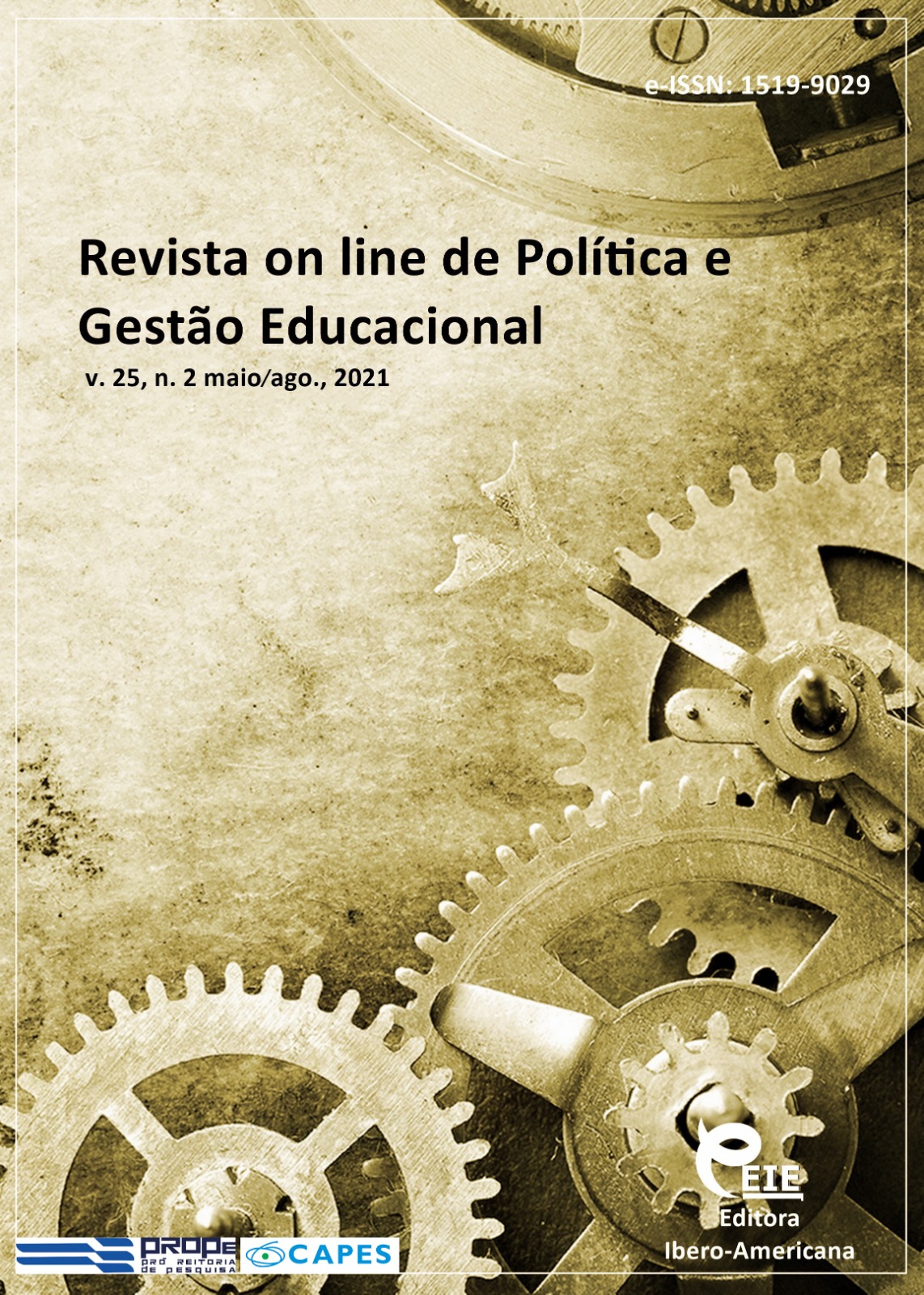O papel e o lugar da etnopedagogia no ecossistema educacional
DOI:
https://doi.org/10.22633/rpge.v25i2.15317Palavras-chave:
Educação, Ecossistema educacional, Povos do ártico e do norte, Digitalização, EtnopedagogiaResumo
Este artigo aborda vários sistemas educacionais que levaram a transição para o ecossistema educacional. A aplicação de bases etnopedagógicas no moderno processo educacional inovador expande as fronteiras do conhecimento sobre o modo de compreensão do meio ambiente educacional, proporciona a formação da consciência ecológica e forma estruturas de visão do mundo, a priori proporcionando a coevolução da pessoa e da sociedade, do indivíduo e da natureza, da pessoa e do mundo. O processo de transição do ambiente educacional para o ecossistema educacional, concentra-se na aprendizagem ao longo da vida e no desenvolvimento profissional contínuo, adaptando a pessoa aos novos desafios de nosso tempo. A relevância da transição deve-se ao desenvolvimento progressivo da comunidade humana, que incansavelmente moderniza a essência e o lugar do sistema educacional no ambiente sociocultural. Não menos importante é o papel que deve ser dado aos métodos, mecanismos e formas tradicionais de educação e treinamento pedagógico popular.
Downloads
Referências
BARAKHSANOVA, E. A. et al. Current trends in digital education development in the Republic of Sakha (Yakutia). Espacos, v. 40, n. 22, p. 18, 2019.
BARAKHSANOVA, E. A. et al. Peculiarities of quality management of teachers' e-learning training in the Arctic regions. Spaces, v. 38, n. 55, 2017.
BARAKHSANOVA, E. A. et al. Transdisciplinary approach to training future managers for digital education in Yakutia. Propósitos y Representaciones, v. 8, n. esp. 3, e702, 2020.
BRODO, J. A. Today’s ecosystem of e-learning. Trainer Talk, v. 3, n. 4, 2006. Available: http://enewsbuilder.net/salesmarketing/e_article000615779.cfm. Access: 10 Dec. 2020.
LEURENT, H.; BOER, E. D. Fourth industrial revolution beacons of technology and innovation in manufacturing. The world economic forum. Geneva, Switzerland, 2019.
MARKOVICH, D. J. Social ecology: a book for the teacher. Moscow: Prosveshcheniye, 1991. 173 p.
NAZARCHUK, A. V. Ethics of a globalizing society. Moscow: Direct Media Publishing, 2002. 381 p.
NEUSTROEV, N. D. Pedagogical aspect of globalization and ethnic mentality. Philosophy of Education, n. 2, n. 41, p. 30-36, 2012.
NEUSTROEV, N. D.; NEUSTROEVA, A. N.; SHERGINA, T. A. Individualization and ethnopedagogy at small elementary schools components of vocational training for university tutors. Sibirica: Interdisciplinary Journal of Siberian Studies, v. 17, n. 3, p. 92-115, 2018.
OLEYNIKOV, B. V.; PODLESNYI, S. A. On the concept of "ecosystem of learning" and directions for the development of computerization of education. Knowledge, Understanding, Skill, n. 4, p. 84-91, 2013.
OZHEGOV, S. I.; SHVEDOVA, N.Y. Dictionary of the Russian language. Moscow: ITI Technologies LLC, 2003. 944 p.
RAVEN, J. Competence in modern society. Identification, development and release. Moscow: Kogito Center Publ., 2002. 400 p.
RUSSIA. Philosophical encyclopedic dictionary. Moscow: Soviet Encyclopedia, 1983. 840 p.
SHAPOVALENKO, I. V. Developmental psychology (Evolutionary psychology and developmental psychology). Moscow: Gardariki, 2005. 349 p.
SHCHEDROVITSKY, G. P. System of pedagogical studies (methodological analysis). In: Pedagogics and logic. Moscow: Castal Publishing House, 1993. p. 16200.
TRETYAKOVA, T. V. Concept of pedagogical education development in North-Eastern Federal University. Yakutsk: Printing House of Company Dani-Almas LLC, 2019. 36 p.
UDEN, L.; WANGSA, I. T.; DAMIANI, E. The Future of e-learning: e-learning ecosystem. In: INAUGURAL IEEE INTERNATIONAL CONFERENCE ON DIGITAL ECOSYSTEMS AND TECHNOLOGIES, 2007, Cairns. Proceedings […]. Cairn, Australia: IEEE, 2007. p. 113-117.
VOLKOV, G. N. Ethnopedagogy: textbook for students of secondary and higher pedagogical educational institutions. Moscow, 1999. 168 p.
VYGOTSKY, L. S. Collected works in 6 volumes. In: ELKONIN, D. B. (Ed.). Child psychology. Moscow: Pedagogy, 1984. v. 4, 432 p.
YASVIN, V. A. Educational environment: from modeling to designing. Moscow: Sense, 2001. 365 p.
ZHIRKOVA, Z. S. Management of educational systems: textbook for students of higher educational institutions. St. Petersburg: Science-Intensive Technologies, 2020. 122 p.
ZHIRKOVA, Z. S. The management model of innovation activity in rural schools of the Polar Region. Education and Science. Proceedings of the Ural Branch of the Russian Academy of Education, v. 5, n. 73, p. 92-108, 2010.
Downloads
Publicado
Como Citar
Edição
Seção
Licença
Copyright (c) 2021 Revista on line de Política e Gestão Educacional

Este trabalho está licenciado sob uma licença Creative Commons Attribution-NonCommercial-ShareAlike 4.0 International License.
Manuscritos aceitos e publicados são de propriedade da Revista on line de Política e Gestão Educacional. É vedada a submissão integral ou parcial do manuscrito a qualquer outro periódico. A responsabilidade do conteúdo dos artigos é exclusiva dos autores. É vedada a tradução para outro idioma sem a autorização escrita do Editor ouvida a Comissão Editorial Científica.











